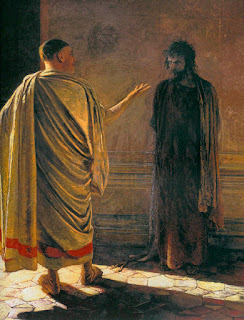Stringfellow: A Naked Christ Strips the Powers
 |
| What is Truth? by Nikolai Ge (1890) (PD-1923 via Wikimedia Commons) |
Free in Obedience, by William Stringfellow (Eugene, OR: Wipf & Stock, 2006)
In the passion story, as Stringfellow reads it, Jesus bears the full brunt of condemnation from (if I may be a little anachronistic) the secular Roman authorities and the religious priestly caste that collaborates with Empire.
What happens in the collision? Stringfellow writes:
Through the encounters between Christ and principalities and between Christ and death, the power of death is exhausted. The reign of death and, within that, the pretensions to sovereignty over history of the principalities, is brought to an end in Christ's resurrection (p. 73).
Resurrection, at least as Stringfellow frames the concept, has more to do with with the quality of freedom with which Jesus lives and dies than with a cosmic or metaphysical event occurring from the other side of the grave. (Incidentally, in his view, the same power of resurrection that Jesus had -- the capacity to live humanly under the conditions of a death-entranced world -- is available to each of us, here and now.)
In essence, according to Stringfellow, Jesus on the cross defeats the fallen powers -- in this case, the principalities of temple and crown -- by stripping bare their claims to legitimacy and veracity. In a certain sense, then, this is a depotentiation by exposure. Though I'd never thought of this before, it strikes me that this exposure forms an ironic analogue to the crucifixion itself as a mode of execution. Recall what St. Paul writes, rather cryptically: "He disarmed the rulers and authorities and made a public example of them, triumphing over them in it" (Col. 2:15). Stringfellow continues:
He bears the fullness of their hostility toward him; he submits to their condemnation, he accepts their committal of himself to death and in his resurrection he ends their power and the power they represent (ibid.).
The saving effect, if I may put it thus, seems to be principally noetic, in the realm of knowledge (though Stringfellow is not inordinately fond of abstract epistemological language). At any rate, that's the emphasis here. But what, if anything, is going on ontologically, in the realm of being? I'm not entirely satisfied with this way of reading him, but it will have to do for today. He does at least hint at the possibility, without really pursuing it, that a broader cosmic battle along the lines of Christus victor-type atonement theories is engaged in the Lord's suffering and death.
In Christ the false lords of history, the principalities, are shown to be false; at the same time, in Christ the true Lord of history is made known. In Christ is both the end and fulfillment for all principalities, for all men, and for all things (ibid.)
I want to be able to know and to say more than Stringfellow does here -- perhaps more than he's willing or able to say. But maybe the point of Good Friday is to tremble and to adore the dreadful mystery rather than rehashing the finer points of soteriology. At any rate, maybe, this is the word we need to hear in our own day, when the principalities of racism, violence, and empire rage every bit as much as, if not more than, they did five decades ago.
==================================
Follow @jsjackson15


Comments